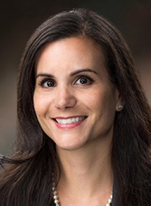
By Kristy Rialon, MD, Assistant Professor of Surgery at Baylor College of Medicine and Texas Children’s Hospital

In July, the American Board of Medical Specialties (ABMS) announced a new leave policy that allows for a minimum of six weeks away during training for caregiver, medical, and parental leave, without extending training. The policy applies to all trainees in programs of two or more years’ duration. For many, this change was both a sigh of relief and something long overdue.
Our training occurs during the time in life when most of the general population is starting a family. Residency and fellowship training programs are time-based, with certain allotments for vacation and leave. Those who are having or raising children, fall ill, or are needed to care for a relative have struggled to balance the time necessary for training with time away for the health of themselves and their family. We all have stories or have heard them: a mother coming back from maternity leave before her body has fully healed, a father with single digit days off to spend time with his new child, and an adoptive parent spending their few days off filing legal paperwork. Then there are those individuals who are feeling sick but still go into work, take brutal call shifts late in pregnancy, or make up shifts when back from leave. These stories are not unique, yet for too long the medical community has asked of residents and fellows what it would never ask of patients. We cannot care for others if we cannot care for ourselves or our families.
This policy change by ABMS is a significant one and will improve the quality of life and well-being of residents and fellows. By recognizing the importance of time away for birthing parents, non-birthing parents, and adoptive/foster parents as well as surrogates, the policy acknowledges that families come in different forms and that each parent plays a vital role in the development of a child.
For female physicians, in particular, allowing greater leave flexibility in training is a critical step toward gender equity in medicine. Many women have contended with the consequences of taking too much leave, whether that be the perceived burden on co-residents, delayed graduation, lost fellowships, or an inability to meet board certification requirements. These consequences have undoubtedly affected the career trajectory of female physicians, but the hope is that greater leave flexibility will not force someone to choose between having a child and advancing one’s career.
As a member of the Accreditation Council for Graduate Medical Education’s (ACGME’s) Council of Review Committee Residents and its Board of Directors, I have been involved in many issues supporting trainee wellness and was fortunate to attend the ABMS/ACGME sponsored Parental and Family Leave Workshop, which occurred in February of this year. The consensus from participants was that improving current leave policies was not only an appropriate and just move forward, but a necessary advancement to improve the training environment for residents and fellows. This sentiment was echoed by the many physicians to whom I have spoken and those who have commented on social media. So many of those who have had children, battled an illness, or cared for a family member during training noted how life-changing this policy is and will be, and that it demonstrated compassion and support for our trainees.
Ultimately, this policy is a start. But for it to have wider impact, the culture of medicine must change how it views time away for personal and family reasons. Our altruism must extend to our colleagues. We can maintain high standards for how we train and certify physicians, and still give them the necessary time off to care for themselves and their family. It’s the right thing to do.
© 2020, American Board of Medical Specialties
